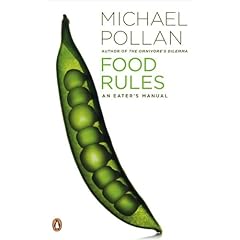*I wrote this (unpaid, unsolicited) review for my workplace 'green' blog and thought I'd share it here as well.
 Michael Pollan, bestselling author of In Defense of Food: An Eater's Manifesto and The Omnivore's Dilemma, has published what is called a "definitive compendium of food wisdom." Food Rules is a short, easy-to-understand guide to eating real food and avoiding over-processed "food-like substances."
Michael Pollan, bestselling author of In Defense of Food: An Eater's Manifesto and The Omnivore's Dilemma, has published what is called a "definitive compendium of food wisdom." Food Rules is a short, easy-to-understand guide to eating real food and avoiding over-processed "food-like substances."Pollan's mantra of "Eat food. Not too much. Mostly plants." was established after the extensive research he did for his previous books. He found that all the science and techno-babble about the nutritional value of food could be simplified down to its core: real food is what's important. Not the additives, the preservatives, the artificial, the pre-packaged - real food. This philosophy is reiterated again and again, with rules such as "Avoid food products that have ingredients that a third-grader cannot pronounce," and "It's not [real] food if it's called by the same name in every language (Big Mac, Pringles, Cheetos, etc.)"
The book not only discusses what to eat, but also how to eat. Pollan discusses the problem with "Western" food culture in the introduction, and breaks down the way we eat as one of the key issues alongside what we eat. Common sense wisdoms such as "Stop eating before you're full" and "Spend as much time enjoying the meal as it took to prepare it" encourage readers to pay attention to how they're eating to avoid overindulgence.
Pollan's previous works cover some of the same material, but go into much more detail regarding the science and statistics behind the reasons for avoiding processed foods. Food Rules is, in essence, the simplified version. Some of the 'rules' were written by Pollan, but in the introduction he discusses his process for this book, talking to not only nutritionists, doctors, and food scientists but also folklorists, anthropologists, mothers and grandmothers, looking for insight into what rules, ideas, wisdoms, and sayings about food are not only truthful, but have survived the tests of time and culture. The result is a common sense, simple to follow guide for eating healthfully.
(If you'd like to borrow my copy of the book, feel free to ask! It's also on sale on Amazon.com for $5 - less than half the cover price.)


